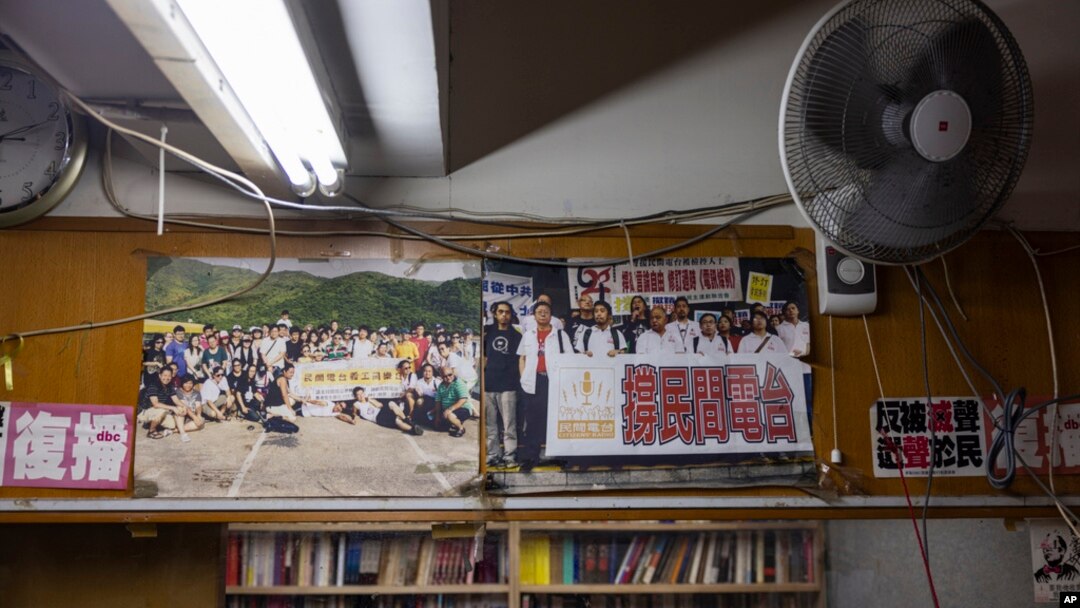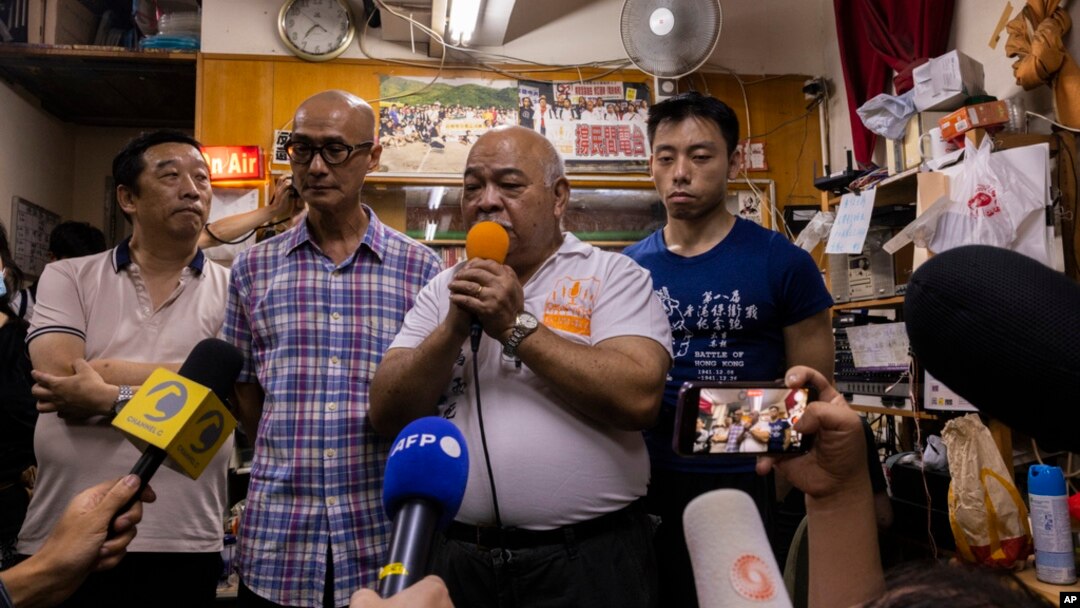BANGKOK - A Hong Kong radio station shut down Friday, citing the city’s “dangerous” political situation.
Citizens’ Radio, a Cantonese-language station, said it was forced to close after officials blocked it from accessing funds via crowdsourcing and donations.
The closure came on the third anniversary of Hong Kong's enactment of its national security law, which roughly a dozen other media outlets have cited for their decisions to close since 2020.
Separately, Hong Kong officials denied entry to a freelance journalist from Japan. The journalist, Yoshiaki Ogawa, was cited in media reports saying he was not given a clear explanation, other than he could not be granted permission to stay.
VOA emailed the National Security Bureau for comment but as of publication had not received a response.
Red lines everywhere
Founded in 2005 by former pro-democracy legislator Tsang Kin-shing, Citizens’ Radio was known for its politically hard-hitting talk shows, advocacy for press freedom and hosting of several pro-democracy figures.

Old photos showing protests in support of Hong Kong's pro-democracy Citizens' Radio station are hung at the radio station's office in Hong Kong, June 30, 2023.
In a Facebook statement last week, Tsang said there were “red lines everywhere” in Hong Kong, that the political situation was “dangerous” and that it had become difficult to invite guests on the show.
Tsang added that the Citizens’ Radio bank account had been blocked, and that the station could afford the rent only until August, which “forced” the broadcaster to discontinue. Citizens’ Radio had been dependent on donations to stay online.
Mark Lee, a host for Citizens’ Radio for the past seven years, told VOA the closure came “quite suddenly.”
“After we knew that our Hang Seng [bank] account has been frozen, I knew our days are numbered. When I received the message from Mr. Tsang, I wasn’t surprised,” Lee said.
“It is harder and harder to get funding nowadays because there are a lot of red lines. Operation difficulties, we don’t know what we can talk about and not talk about. Many of our potential guests are maybe afraid to come to the radio station to [be on the] program,” Lee added. “Since 2020 this has caused a lot of difficulties [for] sustainable operation. I will say this [is] maybe a death [by] a thousand cuts. Citizens’ Radio is just one of them.”
Chilling effect
Media analysts and journalists in Hong Kong have been vocal about the chilling effect that they say the national security law has had on journalism.
Beijing imposed the law, which prohibits acts deemed as secession, subversion or foreign collusion, following the anti-government protests in 2019.
Hong Kong authorities have used that and a colonial-era sedition law to arrest more than 250 people, including pro-democracy politicians, activists and journalists.
Beijing insists the law is necessary to stabilize the city from civil unrest.
Hong Kong’s Security Bureau has previously told VOA, “Hong Kong residents enjoy the freedoms of the press and speech,” but that “freedom of speech and freedom of the press are not absolute and can be restricted for reasons including protection of national security in accordance with the International Covenant on Civil and Political Rights. Journalists, like everyone else, have an obligation to abide by all the laws.”
Hong Kong was once a model for press freedom in Asia. Since the security law came into force, however, at least 12 other media outlets have closed, including pro-democracy outlets like Apple Daily and Stand News.
Apple Daily founder Jimmy Lai, jailed since the end of 2020, faces the possibility of life imprisonment at his latest trial, slated for September, in which three handpicked national security judges will weigh allegations of foreign collusion.
SEE ALSO: Lawyers Call on Britain to Advocate More for Jailed Hong Kong PublisherRepeatedly targeted
Since its creation, Citizens’ Radio has operated as a “pirate radio” station after applications for radio licences were denied. The station, which has long been a target of pro-Beijing supporters, was accused of illegal broadcasting in 2009.
In 2016, authorities raided the station after it was suspected of using an illegal radio transmitter for its FM broadcasting. And in 2019, masked men barged into the station wielding bats after smashing through its front door.
“Citizens’ Radio is one of the first civil-led radio and online radio stations in Hong Kong,” Michael Mo, a former district official in Hong Kong, told VOA. “They challenged the constitutionality of the Telecommunication Ordinance, which in their view restricted freedom of speech through a high threshold radio-licensing system.”
Mo added that the station had an impact on Hong Kong’s civil society, and that its staff had worked “tremendously hard” to stay in business this long.
“On the impact of civil society, they nurtured another group of civil-led radio in 2009 and nurtured many activists who later turned active in politics,” he told VOA. “After the 2019 protests and [national security law], some of their hosts were jailed, and it is hard to find guests who dare to speak.
“It made them tremendously hard to operate nowadays,” he added. “Indeed, other online channels in Hong Kong are facing exactly the same thing.”
Lee, the Citizens’ Radio host, added that although its last show aired Thursday, he is hopeful that the station’s programming can continue in an online format.
“Our radio frequency is used by the government,” he said. “Since our audience largely comes from older generations, many of them do not know how to use YouTube. Therefore, we have lost a lot of our audience.
“Nowadays if we have content, you can publish it on the web,” he added. “The FM radio station is not a must to broadcast our message. Some of the hosts may start a new YouTube channel.”
Irreplaceable
Ronson Chan, chair of the Hong Kong Journalists Association, calls the closure a reflection of the city’s tough media environment.
“On behalf of the journalists association, we hope that there are diversified voices in Hong Kong,” Chan said. “It’s quite sad we lost an independent media outlet today. We think it is not easy to operate, and they tried their best to survive. It can reflect how tough the situation and environment [is] for the media in Hong Kong today.”
Cedric Alviani, East Asia director for Reporters Without Borders (RSF), said the shuttering of Citizens’ Radio is an “irreplaceable loss.”
“For nearly two decades, Citizens’ Radio has been an emblematic contributor to Hong Kong’s independent broadcasting landscape, and its shutdown will cause an irreplaceable loss,” said Alviani in an RSF statement.
“We urge the government to stop its policy of harassment against independent media outlets, which have already significantly damaged the territory's international image since the enactment of the national security law.”
Hong Kong is ranked 140th out of 180 on the RSF press freedom index, where No. 1 reflects the best media environment. The watchdog says Hong Kong has suffered a “unprecedented setback” since the law was enforced.


